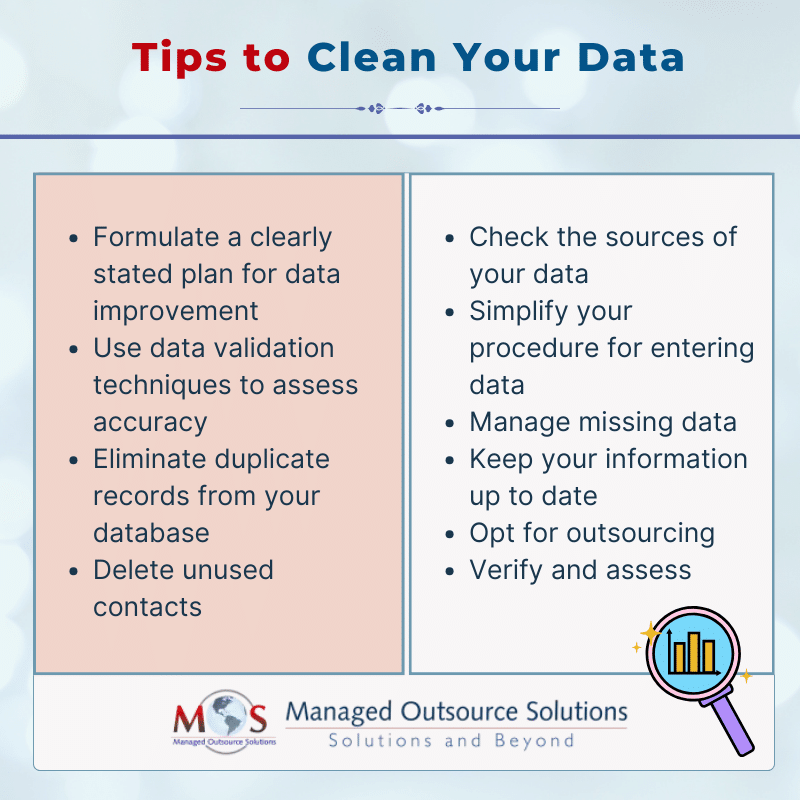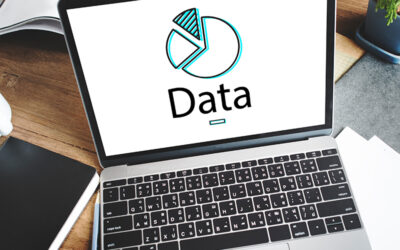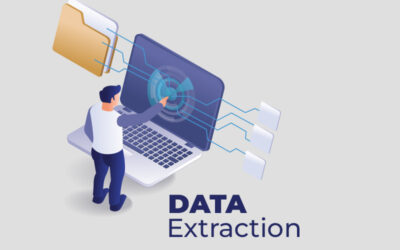Most individuals would agree that the quality of your research and insights depends on the data you are using. If you want to establish a culture in your company where decision-making based on quality data is valued, one of the most crucial tasks is data cleaning, which is also known as data cleansing or data scrubbing. An organization can improve decision-making by cleaning up its data with the assistance of a reliable data cleansing service.
Importance of Cleaning Data
Clean data is essential for success in data-driven firms, which are increasingly depending on big data and intelligent automation. However, data can get polluted and unsuitable for use. The state of a corporation can be impacted by dirty data. Using low-quality data to support strategic or operational decisions may affect competitive positioning and necessitate financial restatements. Before this data can be used with confidence in making decisions, it needs to be cleaned up and processed. Research indicates that the typical CRM data deteriorates at the rate of thirty percent each year, costing firms an astounding $9.7 million in lost revenue yearly. New and accurate information is no longer a luxury in a world where data is king rather, it is essential for success and survival. For this reason, data cleansing could be the key component missing from your B2B marketing plan. It may result in more effective marketing, contented clients, superior leads, and a larger return on investment.
The Three Pillars of Data Cleanliness
Master data management, data quality, and data governance are the three cornerstones of clean data. For the data’s value to increase, all three functions must cooperate.
-
- Data governance: Data governance maintains data in the proper structure and manages it efficiently to ensure usefulness. This includes monitoring data usage, ensuring compliance, and establishing rules, processes, and controls for data management.
- Quality of data: Efforts to guarantee that your data is timely, accurate, full, and consistent are included in data quality assurance. Decisions made with data that doesn’t adhere to these standards may be flawed since it is unreliable.
Following are some things consider when evaluating the quality of your data:
-
- Completeness: Is all the information at hand?
- Consistency: Can data from different databases be matched?
- Uniqueness: Does the data have a single definition?
- Validity: Do the records adhere to the guidelines?
- Accuracy: Is the information accurate?
- Timeliness: Can you access the data when you need it?
- Master data management: Uniqueness and non-duplication of data are the cornerstones that master data management guarantees. This entails locating distinct data items, getting rid of duplicates, and guaranteeing uniformity between various domains and systems.
Five Steps to Clean Data
- Formulate a Clearly Stated Plan for Data Improvement: Begin by providing a clear plan for updating your data and making sure it satisfies the exact requirements of your company. Who will take the helm of this project and how will it be implemented? Establish the parameters of “quality data” for your group. What particular information has to be gathered? How will you know whether your attempts to clean up your data were successful? Finally, investigate the finest software and tools for identifying duplication and streamlining data entry. You will have a clear plan for the future after you have the answers to these questions customized for your particular business kind and procedures. In order to plan and reach their objectives, businesses can also ask B2B data solutions providers for advice.
- Use Data Validation Techniques to Assess Accuracy: Verifying the quality and accuracy of source data prior to using, importing, or processing it is the main goal of data validation. Data validation can be carried out manually or automatically using appropriate tools. It is best to engage service providers who can carry out this function, even though the vetting procedure could require hours and significant human resources in certain circumstances.
- Eliminate Duplicate Records from Your Database: Any organization can experience problems with duplicates. Having duplicate entries implies your marketing campaigns may contact the same prospects within a firm more than once, especially in the B2B sector where there are several touchpoints. This prolongs your marketing efforts and raises the possibility that you may lose prospects in the process. Multiple data entry places and inconsistent data entry are the two main causes of duplicates. However, duplicate data can be addressed using data quality management services, which eliminate the need for labor-intensive manual searching and sorting.
- Delete Unused Contacts: Reaching out to spam accounts or inactive contacts is a waste of time and effort for marketers. But how can you tell if the people who are responding to your campaign are real, interested people? To get around this obstacle, make it a habit to examine the click-through and open rates from your email marketing campaigns. Move those email addresses off your list and focus on others who are more active if you haven’t heard back from them after a predetermined amount of time.
- Check the Sources of Your Data: Inaccurate data frequently originates with the initial collection of false information. Correcting your sources is the first step towards creating a trustworthy database. Customer information may be gathered from various sources. It’s critical to evaluate these sources to determine which one(s) contributed the unnecessary information. Identifying the issue early on can also save you a great deal of grief down the road. It enables you to concentrate your efforts on more likely prospects, increasing the long-term efficacy of your initiatives.
- Simplify Your Procedure for Entering Data: Make sure your data collection and organization processes are well defined in order to reduce errors and maintain efficiency. Make a set of guidelines that address anything from whether fields are necessary for prospect records to whether to use capital or lowercase letters. This makes your database more accurate and consistent overall.
- Managing Missing Data: Since many algorithms will not accept missing values, you cannot overlook missing data. There are two approaches to handling missing data. The first approach is to eliminate observations with missing values, but be aware that doing so will result in the loss or decline of information. Another way to is to enter missing numbers based on other observations; however, this may lead to you working with assumptions rather than actual observations. You may change how null values are navigated by using the data differently.
- Keep Your Information Up-to-Date: Recall that data cleansing is a continuous process. While having a well-defined process is helpful, it’s crucial to make sure your database is updated on a regular basis. Whether a prospect enters a false detail, makes an honest mistake, or modifies information, some errors are unavoidable. Regular data cleansing is therefore essential to preserve its accuracy. Decide how frequently you want to clean up your data, try to do so a few times a year. Additionally, if you’d choose, you may either manage it internally or use a reputable company to handle it hassle-free for you.
- Opt for Outsourcing: Outsourcing data cleansing to a specialized organization can be a wise decision if handling the process internally seems too complicated or time-consuming. You can guarantee comprehensive and effective data cleansing and free up your staff to concentrate on other crucial duties by giving this duty to professionals. Additionally, outsourcing data cleansing can give you access to cutting-edge resources and know-how, producing data that is more accurate and trustworthy for your company’s operations.
- Verify and Assess: As part of basic validation, you ought to be ready to respond to these queries once the data cleaning procedure is complete:
- Is the data consistent?
- Does the data adhere to the standards that are relevant to its field?
- Does it support or contradict your working hypothesis? Does it shed any light on it?
- Is it possible to identify patterns in the data to inform your next theory?
- If not, is there a problem with the quality of the data?
Do you want to improve data quality?
Read our blog post, Tips for Improving Data Quality Using Data Cleansing Services.
In the world of business today, data is king and is essential to generate meaningful return on investment. A B2B company’s decisions are almost always based on a plethora of data that is gathered from many sources. Due to this, it’s imperative that you maintain a clean and organized client database through the use of a strong data cleansing approach.
Efficient data cleansing not only facilitates well-informed decision-making but also enhances return on investment and fortifies company partnerships in the long run. Thus, you will have access to clean data that will support business growth if you choose to outsource your unclean data to a reliable data cleansing service.
Unlock growth opportunities and maximize your return on investment with our services.





